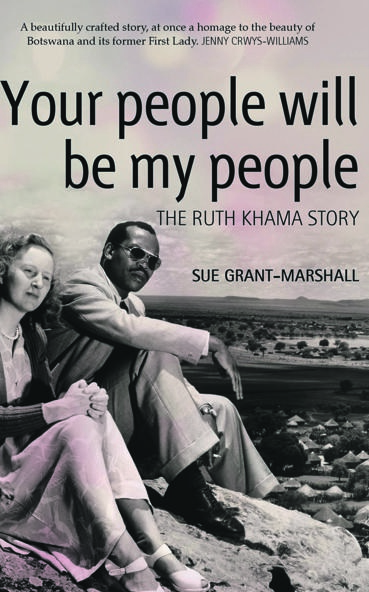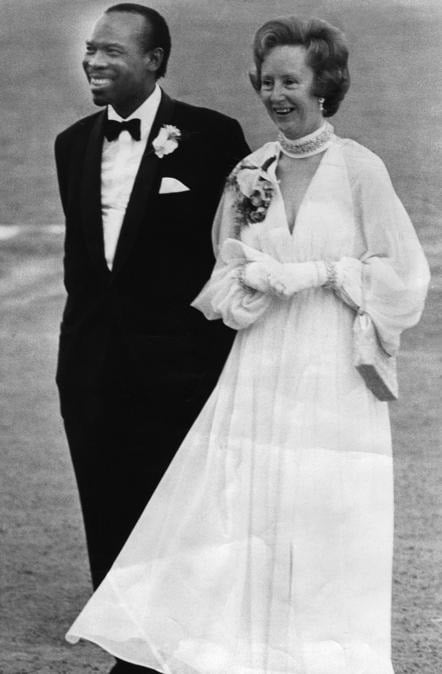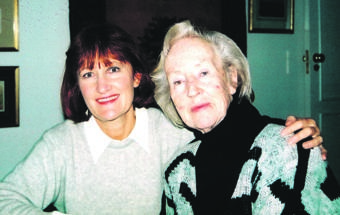
Your people will be my people: The Ruth Khama Story by Sue Grant-Marshall
Protea Book House
376 pages
R295
Growing up in the Bechuanaland Protectorate that is now Botswana, journalist Sue Grant-Marshall followed the story of the continent’s famous interracial first couple, Ruth and Seretse Khama.
She read how cruelly they were kept apart by the British administration – pregnant Ruth in Serowe and Seretse in Lobatse – and resolved that one day she’d write Ruth’s story.
This extract tells of the couple’s reunion
In April 1950, Ruth no longer had her Palapye friends to visit (the British administration had had them moved) and so she relied on the traders and on journalists.
Many British officials who wouldn’t admit publicly to it had a great admiration for the woman, who, although heavily pregnant, and deeply in love with her husband, stuck it out on her own, in her miserable isolation.
Many thought they would never have had the courage to remain in Serowe in similar circumstances, and to those who said as much in later years, Ruth replied:
“Oh but you would have. I don’t think you would have leapt into a car if it meant your husband couldn’t see his people again. And don’t forget, you are fighting for a principle anyway …”
Ruth always had, quite literally, the courage of her convictions.
Ruth was as much the subject of police intelligence surveillance as was Seretse, and one policeman said that, at times, it was done quite openly so that Ruth should not feel at home in Serowe. “We would follow her wherever she went in the village. It wasn’t pleasant duty.”
As Ruth grew more miserable by the day, she asked her doctor to tell the administration that she would have a nervous breakdown if she didn’t see Seretse.
News of her unhappiness at being separated from Seretse and of the strain on her health soon reached London, where a member of Parliament, Fenner Brockway, wrote to the secretary of state, Patrick Gordon Walker, begging him “to remove all impression of an absence of human approach”, and taking him to task for not allowing Seretse to visit Ruth.
He also expressed concern at the “humiliating conditions” under which Seretse was living, saying: “One gets the impression that the whole approach to him is unsympathetic and unappreciative of his sensitiveness to any indignity.”
And he finished his letter with a sentence that alarmed Gordon Walker: “I am doing my utmost to bring about an agreement between Tshekedi and Seretse and this looks promising.”
The secretary defended his actions by saying that it was due to Ruth’s determination to remain in Serowe, when she was free to join her husband in Lobatse that kept the couple apart.
He was clearly peeved at Ruth’s obstinacy.
It is of interest that Gordon Walker, while lauding any efforts to end the uncle/nephew feud, pointed out that any reconciliation between the two men would not necessarily remove the “anxieties and misgivings which led the government to withhold recognition of Seretse”.
And while he stuck to the White Paper for his reasons for this, we now know that, of course, any reconciliation between Seretse and Tshekedi (his uncle) and resultant peace within the tribe would not have made apartheid South Africa at all happy.
And so the war of words continued between Brockway and Gordon Walker, between Ruth and the administration, and Seretse and the administration, and with the Seretse Khama Fighting Committee threatening to take the issue to the United Nations Trusteeship Committee.
News of her threatened nervous breakdown was soon picked up by the press, but Ruth was not the only one who wanted to see Seretse.
As soon as the tribe had heard of his return to the protectorate, they began flocking into Serowe.
Angry Seretse supporters fought Tshekedi supporters and, in the ensuing riot, the police resorted to tear gas and arrested 11 alleged ringleaders.
Subsequent press reports described Serowe as an armed camp patrolled by tin-hatted police, armed with rifles and heavy batons.
The upshot was a British statement that the government might reconsider its decision to allow Seretse to be in the protectorate, and Gordon Walker said in Parliament:
“We are not going to be intimidated by violence or threats of violence. Seretse’s return to the protectorate is on condition of his own good conduct, and (also) that order and good government of the tribe are not disturbed.”
But despite its threats, the government, painfully aware of the attentive press that was shocked at the way the authorities were keeping the couple apart, decided that it would lose more than it could gain by continuing to withhold permission for Seretse to visit Serowe.
A decision was therefore made to allow him to return for a specified period under certain strict conditions.
Seretse set off on his journey north on April 15. It was more than two weeks after his return from London, and nearly nine weeks since he had last seen Ruth.
When dusk fell, Ruth sat down to wait for Seretse with a group of newspaper correspondents.
Every time the sound of a vehicle was heard, the chatter would stop, in spite of them all knowing that Seretse was not allowed to appear until midnight.
Into the silence would fall the sound of the hissing pressure lamps and occasionally the cry of a jackal howling across the plains.
Ruth was tense and keyed up, straining her ears as the night wore on to distinguish the sound of a truck against the night chorus of croaking frogs and chirping crickets.
It was almost midnight and Ruth was sitting at the bungalow window, when, through the still night, she heard the sound of an approaching engine and, instinctively knowing it was Seretse, she leapt up from her chair and ran out into the night with the press hot on her heels.
Nimble feet flying, she raced down the bush-lined sandy track for several metres before the bright lights picked up her pregnant form from a distance.
“Stop!” ordered Seretse and flung himself out of the truck.
They ran towards each other down the road, arms outstretched, hands reaching for each other.
It was a minute after the allotted time of midnight, and if anybody had tried to stage manage a more dramatic meeting between the world’s most famous couple, they would have been hard put to outshine that one.
As she felt Seretse’s warm arms enfold her, Ruth’s eyes filled with tears of joy as they clung to each other.
They remained clasped silently to each other, oblivious for a few seconds to the waiting forms in the darkness.
The press caught its breath at the sight of the reunion, and they felt a sense of intrusion and a pricking of their eyelids as they witnessed such intimacy.
Then the night exploded with flash bulbs as, one after the other, they lit up the bush, the road and the happy couple.
After a while, Ruth climbed into the truck with Seretse and, surrounded by a few ululating women and men shouting “pula!”, they drove slowly to the bungalow.




 Publications
Publications
 Partners
Partners











